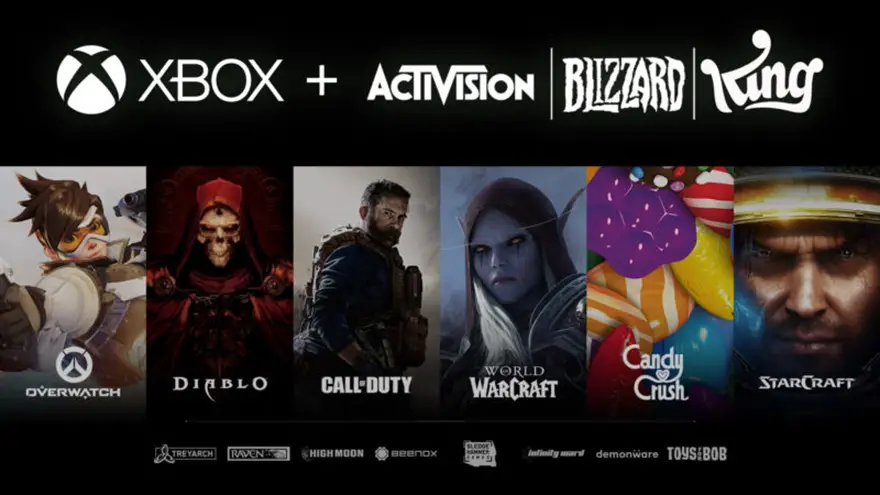In a surprising turn of events, EU regulators have granted approval for Microsoft’s massive $68.7 billion takeover of Activision Blizzard. This decision contradicts the stance taken by UK and US authorities, putting the European Union at odds with its counterparts.
The European Commission’s approval was contingent on Microsoft’s commitments regarding cloud gaming. The EU determined that Microsoft would have no reason to withhold the distribution of Activision’s games from Sony. Even if Microsoft did choose to remove Activision’s games from the PlayStation, it would not significantly impact competition in the consoles market. However, both the EU and UK regulators recognized the potential anti-competitive effects on PC and console game distribution through cloud gaming services.
To address these concerns, the European Commission proposed solutions in the form of 10-year licensing agreements offered by Microsoft to competitors. As part of these agreements, consumers in EU countries would receive a free license enabling them to stream current and future Activision Blizzard PC and console games via any cloud gaming service of their choice. Cloud providers would also be granted a free license to stream these games in EU markets.
These licenses ensure that consumers have the right to stream their purchased or subscribed Activision Blizzard games on any cloud gaming service and on any device using any operating system. It seems that the European Commission insisted on the implementation of these automatic licenses, and Microsoft has agreed to apply them worldwide.
Margrethe Vestager, Executive VP in charge of competition policy at the European Commission, commented, “Our decision represents an important step in this direction, by bringing Activision’s popular games to many more devices and consumers than before thanks to cloud game streaming. The commitments offered by Microsoft will enable for the first time the streaming of such games in any cloud game streaming services, enhancing competition and opportunities for growth.”
The EU’s approval of this monumental deal follows the recent rejection of Microsoft’s plans by UK regulators. The UK’s Competition and Markets Authority (CMA) blocked the acquisition due to concerns about the cloud gaming market, citing potential limitations in innovation and choice for UK gamers. Microsoft is currently appealing this decision.
In an effort to address regulatory concerns surrounding cloud gaming, Microsoft has been actively engaging in deals with various companies, including Boosteroid, Ubitus, Nvidia, and Nintendo. These 10-year agreements also encompass access to Call of Duty and other Activision Blizzard games, contingent on regulatory approval.
The CMA is concerned that Microsoft’s control over popular franchises like Call of Duty, Overwatch, and World of Warcraft would give it a significant advantage over competitors in the cloud gaming market, where it already holds a 60 to 70 percent share.
While the EU’s decision may bolster Microsoft’s chances of success, the company still faces challenges in the US and UK. Other countries, including Saudi Arabia, Brazil, Chile, Serbia, Japan, and South Africa, have already approved the deal, while China, South Korea, New Zealand, and Australia are still reviewing it.
The next major obstacle for Microsoft is closer to home—the Federal Trade Commission’s legal action against the Microsoft-Activision Blizzard deal. The case is currently in the document discovery stage, with an evidentiary hearing scheduled for August 2nd. The outcome of the case is still months away.
Activision Blizzard CEO Bobby Kotick welcomed the EU’s approval, expressing the company’s intention to expand investments and workforce throughout the EU. However, the CMA stood by its position, stating, “The UK, US, and European competition authorities are unanimous that this merger would harm competition in cloud gaming.” The CMA emphasized that Microsoft’s proposals would replace a free and competitive market with one subject to ongoing regulation, a key reason for rejecting the deal. Although the European Commission holds a different perspective, the CMA remains firm in its decision.
Microsoft now faces an uphill battle as it appeals against the CMA’s ruling. Despite the concessions made to the EU to secure approval in Europe, the software giant will need to navigate a challenging path ahead.
The CMA’s firm stance underscores the importance of the cloud gaming market and the potential consequences of Microsoft’s dominance. By accepting Microsoft’s proposals, the European Commission allows the tech giant to dictate the terms and conditions of the market for the next decade. This shift from a free and competitive market to a regulated one has far-reaching implications for the games Microsoft sells, the platforms it sells them on, and the conditions of sale.
Although the European Commission’s view differs from that of the CMA, the UK regulator remains resolute in its position. While acknowledging and respecting the EU’s decision, the CMA stands firmly behind its original judgment.
The road ahead remains challenging for Microsoft, especially as it seeks to overturn the CMA’s ruling. While the EU’s approval may provide some momentum, the company still faces significant obstacles in the US and UK. The outcome of the legal battle with the Federal Trade Commission is yet to be determined, and it may be months before a resolution is reached.
In the midst of these developments, Activision Blizzard CEO Bobby Kotick welcomed the EU’s approval and expressed enthusiasm for expanding investments and workforce within the EU. However, the disagreement between regulatory bodies underscores the complexity and impact of this acquisition.
As Microsoft continues to pursue its acquisition of Activision Blizzard, the future of the gaming industry hangs in the balance. The decisions made by regulators worldwide will shape the landscape of cloud gaming and competition in the years to come. The outcome of these battles will not only impact the companies involved but also have far-reaching implications for gamers and the gaming community as a whole.
